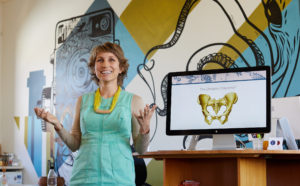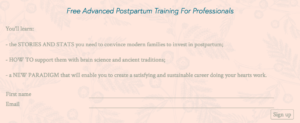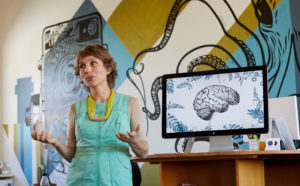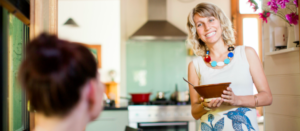fSpace Profile – Julia Jones, Newborn Mothers
In a new series, _fSpace_ is profiling members of our coworking space. We begin with Julia Jones, Founder & Director of Newborn Mothers.
Written by Belinda Teh
Julia is an author and entrepreneur who runs her business Newborn Mothers from fSpace two days a week. She started her journey as a postpartum doula, a non-medical professional who provides emotional and physical support during a woman’s transition into motherhood.
If you’re sitting there thinking: I’ve never even heard of a doula before – you’re not alone. And this, Julia says, is exactly what needs to change.
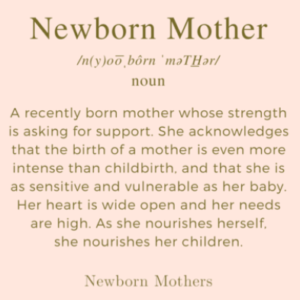
In most western societies, the needs of mothers after childbirth are often overlooked as the needs of newborn babies take centre stage. However, this is not the case in all countries.
In China, the custom of ‘confinement’ is widely practiced where the mother remains indoors to rest, breastfeed and bond with her baby for 30 days after giving birth. A ‘confinement lady’ cooks, cleans and does the dreaded nights of broken sleep each time the baby cries.
Similar post-delivery practices exist in countries all over the world including India, Japan, Mexico, Korea and many in the Caribbean.
In Malaysia, there are postpartum professionals who specialise in massaging mums who have just given birth. “These countries see the postpartum period as an enrichment process,” says Julia.
“Mothers are pampered and celebrated, she’s expected to ask for as much help as she needs and most importantly, she’s allowed to make mistakes. It’s a period of loving and learning.”
Unfortunately, these practices are a far cry from what many new mothers in developed western countries currently experience. Far too many feel confused, guilty and inadequate as they struggle through the first few sleepless and tearful months.
“There’s no village,” says Julia. “After giving birth, mothers generally receive little guidance and training from the mainstream healthcare system beyond practical baby care and breastfeeding. As our society is built on nuclear family households, the isolation of mothers is systemic. They feel that they should be able to do everything themselves. They live with a lot of guilt for not meeting their breastfeeding or sleeping goals, and we glorify this idea of being a super-mum.”
For Julia, it is concerning that so many new mothers are expected to adopt a ‘business as usual’ attitude. And what she finds the most concerning of all is that the leading cause of all maternal deaths within 12 months of giving birth is suicide.
Despite this challenging landscape, Julia envisioned a society with a completely different approach to new mums. She realised that in order to get there, she would have to do more than just working as a doula with mothers on a one-on-one basis. Real change could only come from educating the greater community on the value of supporting newborn mothers and sharing that knowledge with as many postpartum professionals as possible.
For Julia, that meant pulling together her a radically new paradigm of her own and training midwives and doulas who could then go out and be advocates for change.
“At the beginning of my career, I completed five different doula trainings, but I knew it just wasn’t the answer I was looking for,” says Julia. “None of them really addressed how to support new mothers through this major life transition, this rite of passage. So I drew on my knowledge of brain science, anthropology and Ayurvedic medicine that I’d gained on my own journey of motherhood, and it turns out it’s what many professionals in the postpartum industry have been searching for too.
I’ve had emails from experts in the field who have been working for 20 years tell me they’ve never seen anything like this before, and they’re 100% behind me.”
Julia now has over 200 students in dozens of countries around the world who take her courses online. Apart from her professional development course that is accredited by the Australian College of Midwives, Julia has also written a cookbook, created a postpartum course for pregnant mothers and will soon be launching a book due in January.
She’s currently running her most ambitious crowdfunding campaign to fund the launch and has plenty more projects planned for 2018.
So how does Julia maintain a balance and sense of calm while running her business, juggling three kids and still having a life of her own?
Julia practices what she preaches and has built her own village: she has a babysitter, a cleaner, her mum helps, her husband does school drop offs.
She pays for and asks for (and accepts) a lot of help. She also has two assistants that help her run the business. “Forget being a super-mum!” Julia says. “Identify what drains you and delegate.”
Coming to fSpace is another essential part of running her business. Julia realised early on that she needed to find a dedicated workspace when her third child was banging on her office door while she was trying to get her work done.
She sat down with her husband to discuss the idea of committing to a coworking space, and they worked out that having Julia out of the house and leaning into her business two days a week would ultimately benefit the whole family.
When asked what the best thing about coming to fSpace is, Julia laughs: “It’s quiet! And I can drink my coffee while it’s hot! I’m very blessed, I’ve got three kids and the house is constantly full of people, but fSpace is quiet and calm and grown up. It’s opposite to home.”
But despite all that she’s achieved in the last 10 years, Julia says there’s still so much work to be done. “Doulas are currently all employed out of small private businesses. But ideally, doulas should be publicly funded. Recently, the child health nurse has been pushed out of public funding. In light of such terrible statistics about maternal suicide, depression and anxiety, we can’t be pulling back!”
At the same time, Julia points out that having more women in positions of power are an essential part of the puzzle. “In New Zealand for example, there is a much higher representation of women which means that women’s issues are given attention and women’s perspectives are considered. Australia’s got some work to do!”
On a more personal level, Julia says that the mindsets of mothers everywhere also needs to change. “Mums these days don’t think they deserve to be happy or feel that they can claim they’re a good mum. It’s ok to ask for help and it’s ok to talk about it when you’re struggling. Most importantly, don’t disappear into your role as a mother. It’s important to have your own dreams outside of your baby.”
“I’m certainly pursuing mine, and I wouldn’t have it any other way.”
Learn more about Newborn Mothers at www.newbornmothers.com.
